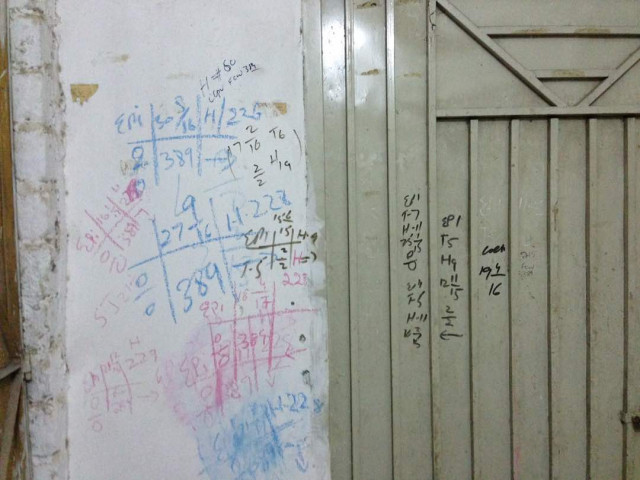'My wall isn't the govt's Scribble N' Play board'
Peshawar residents complain about markings polio and census teams leave on their walls and gates

Various markings left by polio and other government survey teams. PHOTO: Izhar Ullah
Found on almost every house or flat in the country, these markings, which make the exterior walls of houses look like a whiteboard in a math geek’s office, are definitely not appealing, and several Peshawar residents have complained that they make their houses look ugly.
Although the jumble of letters and numbers are not easy for a layman to understand, they are not complex math equations either. Government workers leave them on gates and walls of houses when they go on various door-to-door surveys and drives. Despite residents’ complaints, these markings are highly significant because they help immunisation teams, particularly polio workers, keep track of the vaccination status of the children in a house and ensure that a house and its occupants have been counted – as is the case in the ongoing census.
Defacing properties: Wall chalking mars Faisalabad’s sidewalks
Locals aren’t too excited about having their walls defaced like that though.
Ahmad Ali, who lives in Gulbahar, says polio teams and other government department surveyors had left his house wall and gate completely covered with markings on every visit. He became so sick of the mess that he repainted his wall to remove them. But a polio team came by when he wasn’t home and left another set of markings again.
“I am not against polio teams visiting my home but my home door and walls should not be marked with ugly lines and bad writing,” said Ali.
Residents say the government should look into other alternatives for keeping records instead of scribbling on walls.
“The government could instead switch to using electronic methods of conducting surveys that happens across the world,” says Attaullah from Hayatabad. “It can be done easily with the help of international survey organisations.”
Curbing hate speech: ‘Provocative wall chalking to be removed’
In developed countries like the United States, government surveys are regularly carried out and mostly through post, over the phone and online. Field representatives are also sent in if needed. But in developing countries like Pakistan, field workers are the principal method of collecting and maintaining crucial records.
But the people who visit houses and leave these markings don’t do it because they like to deface walls – it’s just part of their job.
“We don’t have any other mechanism for marking houses,” says Akbar Khan, the coordinator at the Polio Eradication Emergency Operations Centre. “We only mark houses to keep a record of children’s immunisation.”
Generally, children are supposed to have a vaccination card which contains details all the doses they have received. The door-to-door teams help ensure that no child is left out during anti-polio drives.
Khan said the teams maintain a diary with all the records too, but the wall markings help the monitoring teams stay updated as well. He added that as people have been raising the issue, they would come up with alternatives.



















COMMENTS
Comments are moderated and generally will be posted if they are on-topic and not abusive.
For more information, please see our Comments FAQ